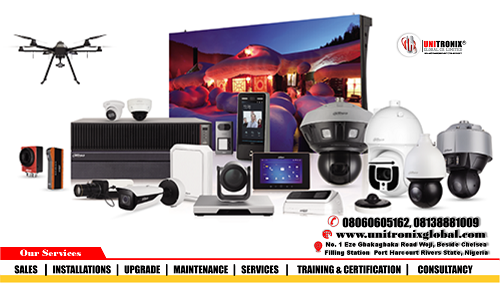CCTV DESIGN, INSTALLATION AND MANAGEMENT TRAINING

Get Trained! Be Certified! Be Employable
CCTV DESIGN, INSTALLATION AND MANAGEMENT TRAINING
WHAT YOU LEARN
Introduction to CCTV Systems: Overview of CCTV technology, components, and their functions. Importance of CCTV in security and surveillance.
CCTV System Design: Understanding the objectives and requirements of surveillance. Site survey and assessment for camera placement and coverage. Design considerations for different environments (indoor, outdoor, critical areas). Camera Selection and Placement: Types of CCTV cameras and their features (analog, IP, PTZ, dome, bullet, etc.). Techniques for optimal camera positioning and field of view calculations. Video Management and Recording: Choosing appropriate video management software (VMS) for monitoring and recording. Setting up recording schedules, resolutions, and compression settings. Cabling and Infrastructure: Types of cables (coaxial, UTP, fiber) and connectors used in CCTV installations. Cable routing, installation techniques, and cable management. Network Configuration: IP camera setup and configuration. Network addressing, subnetting, and VLANs for CCTV systems. Storage Solutions: Selecting storage options: DVRs, NVRs, NAS, cloud storage. Calculating storage capacity based on resolution, frame rate, and retention periods. Remote Viewing and Access: Enabling remote access for live monitoring and playback. Implementing secure remote access through VPNs and encryption. Camera Integration and Analytics: Integrating cameras with other security systems (access control, alarms). Implementing video analytics for motion detection, object tracking, and more. Maintenance and Troubleshooting: Routine maintenance tasks for cameras, lenses, and equipment. Identifying and troubleshooting common issues and malfunctions. Cybersecurity Considerations: Securing CCTV systems against cyber threats and unauthorized access. Best practices for network security and camera hardening. Legal and Ethical Considerations: Compliance with privacy laws and regulations related to surveillance. Ethical considerations when deploying and managing CCTV systems. Emergency Response and Incident Management: Developing response protocols for security breaches and incidents. Coordinating with emergency services and law enforcement. Documentation and Reporting: Creating system documentation, diagrams, and user manuals. Generating incident reports and video evidence for investigations. Practical Exercises and Case Studies: Hands-on exercises for camera installation, configuration, and troubleshooting. Analyzing real-world scenarios and designing effective CCTV solutions.OUR AIM
UNITRONIX TRAINING ACADEMY (UTA) is the training arm of UNITRONIX GLOBAL CO. LIMITED; one of the fastest growing reputable RENEWABLE ENERGY companies in Nigeria. In partnership with the world’s top- rated solar modules manufacturer OEM across the world, we deliver intensive theoretical, practical and on-site installation training in solar energy. Our trainings are delivered in a conducive environment, with experienced professionals and hands-on practical sessions. Our training sessions are very interactive to ensure full understanding of all topics covered. At the end of the training, every trainee will be certified and accredited as a Unitronix Dealer for the purposes of partnership.
BENEFITS OF THIS TRAINING
- Become a certified installer/professional
- Gain employment with premier solar companies
- Engage in business partnerships and mentoring with UTA, the industry’s foremost training institution.
- Stay informed about emerging solar technologies and applications firsthand
- Achieve internationally recognized certification
- Join the UTA alumni network, unlocking exclusive benefits
- Tap into the expertise of our team of skilled engineers
- Attain membership in leading renewable energy associations

